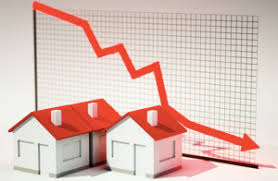Causes of the 2008 Housing Crisis
In order to understand the differences between what happened in 2008 and what’s happening today, we need to first understand the causes of the last financial crisis. When the housing market crashed in 2008, the problem had started years earlier. In the late 90s, Fannie Mae wanted to make home loans accessible to borrowers with lower credit scores so they could attain the American dream of homeownership. Lenders started offering subprime mortgages with unconventional terms to high-risk borrowers. Meaning, people with bad credit and little-to-no savings were offered loans they couldn’t afford.
Such relaxed lending standards fueled the housing market growth and the corresponding rise in home values. As home prices continued to increase, the rising subprime mortgage market thrived. Then, in the second half of 2007, the housing market slowed down and house prices started to decline nationally. And in 2008, the stock market crashed. The build-up of bad debt resulted in a subprime mortgage crisis and the 2008 housing crisis. Homeowners found themselves “upside-down” on their mortgages, meaning they owed more than their home was worth. Faced with job losses and increasing mortgage payments, many lost their homes to foreclosure.
As you can see, the Great Recession in 2008 was a result of a banking crisis and the loss of housing wealth. Today, the problem comes from a totally external factor (the coronavirus pandemic) and the direct losses of income for people and businesses hurt by it. The underlying cause of the current economic distresses is fundamentally different from that which sparked the Great Recession. Nonetheless, that doesn’t mean that people are less worried about a repeat of the 2008 housing crisis. This leads us to our next question.
Will the Housing Market Crash in 2020?
Investors are worried about economic slowdown from the COVID-19 pandemic that’s threatening to slow growth and eat into corporate profits by closing factories, forcing quarantine, limiting travel, and canceling big events. People are getting the idea that this outbreak is going to cause the US housing market of 2020 to crash as the recession did in 2008. However, according to many experts, this doesn’t fit the pattern of the housing crisis in 2008; the story just isn’t the same. This time the bad news comes from external factors, specifically the COVID-19 virus which has greatly impacted the stock market. Many have stated that the current financial crisis resembles the Spanish flu pandemic of 1919 a lot more than the subprime mortgage crisis that caused the Great Recession.
Today, the banking system is actually on solid footing. Banks are on more solid footing than they were before the 2008 housing crisis, with higher capital and limited direct exposures to the riskiest loans. All of this could keep any messiness in the banking sector from turning into a full-blown financial crisis as before. Government regulations also made credit requirements more stringent to make sure borrowers are better qualified. In addition, new changes were made that discourage lenders from extending new mortgages and lines of credit during times of stress. All of this created a more stable mortgage industry as mortgage default and foreclosure rates are significantly lower than they were in 2008. So, how is the coronavirus going to affect the real estate market?
Coronavirus vs the Real Estate Market
If you’re a real estate investor, you must be wondering how this pandemic is going to affect you. Experts say it’s hard to tell seeing that no one really knows how long this is going to last. However, a few housing market predictions could be made after studying how previous pandemics affected the real estate market. Many experts say that the travel, hospitality, and tourism industries will continue to be the main sectors hit directly by the coronavirus outbreak. For example, United Airlines, Apple and Microsoft supply chains from China, and dozens of other companies have warned that the virus will hurt their profits.
As for traditional long term rental property investors, the main US housing market predictions you should know include lower inventory, a slight drop in home prices, and lower mortgage interest rates. In other words, it seems that the fundamental housing market indicators are going down. However, experts say this downturn will be a lot shorter and shallower than the 2008 housing crisis.
One way to conclude this is to think of COVID-19 as an earthquake. This natural disaster can easily cause production to decline in one part of the country as stores close, shipments are delayed and people stay in their homes. But, the economy should snap back once the ground stops shaking. Actually, natural disasters are often followed by a temporary increase in economic activity as people rebuild. So in that way, disasters are different from financial crises which don’t just reduce spending and investment in the short term, but also make people and companies less willing or able to spend for months or years. So far, the coronavirus pandemic looks more like an earthquake than a recession that could cause a repeat of the 2008 housing crisis.
Most economists still expect the US to escape a recession, but that could change quickly as there is still a huge amount of uncertainty. No one can predict the economic impact with any confidence, so we highly advise you to stay updated on coronavirus trends and their impact on the US housing market 2020.








